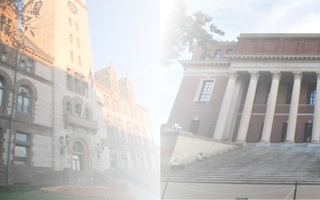Part III of a five-part series on Cambridge City Council election issues. Read each installment on the Fridays leading up to the Nov. 5 election. Part I ran on Oct. 4 and Part II ran on Oct. 11.
For years, the city of Cambridge has viewed itself as a champion of environmental sustainability; it was first city in the state to have a LEED-certified municipal building and second to implement the state’s “stretch code,” an energy efficiency requirement. Despite Cambridge’s progressive streak on environmental issues, however, a new petition put forth by Cambridge attorney and activist Mike Connolly has put the city at a crossroads as it grapples with what a greener Cambridge will look like in the coming decades.
Filed on June 24, Connolly’s petition has pushed the issue of the environment into a central policy to be grappled with in the next City Council term. Also known as the Cambridge Net Zero petition, the initiative would require most large, newly constructed buildings in the city to have no greenhouse gas emissions through the use of clean energy technologies.
Although the future of the petition itself is uncertain, the City has set up a net zero task force, which met on Oct. 10 to discuss the petition and, more broadly, Cambridge’s environmental future.
In interviews with The Crimson, City Council candidates outlined their view on the future of Cambridge, identifying the tensions between the progressive values Cambridge holds and the feasibility and cost of these implementations. There is no comprehensive or unified vision for the future of a greener Cambridge—instead, there are competing interests and ideas for how the City should proceed, both in the short- and long-term.
But in speaking with the candidates, two major areas of concern regarding the environment have emerged—emissions and transportation.
MOVING TO NET ZERO CITY
Cambridge mayor Henrietta Davis declared October “Net Zero Emissions Month” at the Sept. 16 City Council meeting, the same day councillors approved a new task force to examine the wider implications of the Connolly Petition. At the task force’s first meeting, members convened with City Manager Richard C. Rossi and decided that the Manager would present a proposal on Oct. 21 for the Council to vote on.
But the upcoming vote is only the beginning of the net zero movement. The current task force members decided to create a more long-term task force that would start meeting in January, solidifying the idea of net zero emissions and taking more action to preserve the environment.
“[The Connolly Petition is] a great beginning because it requires any corporation or institution that wants to build in Cambridge to take into consideration what this building will produce and then balance it out,” said City Council candidate Elie Yarden. “The Connolly Petition says that you need to account for the cost of the environment. So, net zero is really the way of saying that everything is accounted for into the future. That’s why I support it completely.”
Several other candidates also appreciated the role of the petition in bringing environmental issues to the fore of the elections, but many candidates were not supportive of the push.
Current City Councillor and candidate David P. Maher expressed his support for the movement but was careful to highlight that he would prefer if the city and community would “put the brakes on this lightly” in order to “[bring] the activist voice, the municipal voice, the university voice as well as the experts together and let them together come up with proposals.”
IS ZERO FEASIBLE?
All interviewed current city councillors stated that as the Connolly petition looks today, it is not feasible for it to pass before the City Council. Concerns were raised about how realistic the demands of the petition are, its endorsement of Massachusetts Class 1 Renewable Energy Credits, and its effect on development in the city.
Read more in News
Coop Announces 8.8 Percent RebateRecommended Articles
-
BRIEF: City of Cambridge Divided Into Two Voting DistrictsLast week, Massachusetts Governor Deval L. Patrick ’78, a Democrat signed a state-wide redistricting bill that will divide the city of Cambridge into two voting districts.
-
 Piece of Mind? Piece of Cake
Piece of Mind? Piece of Cake -
As Healy Departs, Cambridge City Council Looks to Find ReplacementWith longtime City Manager Robert W. Healy’s contract due to expire in June 2013, the Cambridge City Council has begun the search for his replacement.
-
City Council Taps Rossi To Be City ManagerIn a move that upset some Cantabrigians and drew praise from others, the Cambridge City Council tapped Deputy City Manager Richard C. Rossi to replace longtime City Manager Robert W. Healy.
-
City Council Passes Resolution Backing HUCTWThe Cambridge City Council passed a resolution last Monday night declaring its support for the Harvard Union of Technical and Clerical Workers as the union continues its ongoing negotiations with the University.
-
 Town and Gown
Town and Gown














